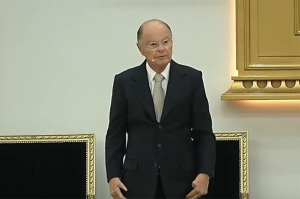Thinking Christianly About Economics
Your immediate response may be, “What does Christianity have to do with economics?” In response, I would say: everything, if you think of economics as the system and means of production and exchange whereby people meet their own and each other’s essential needs.
Lest anyone presume otherwise, to think “Christianly” about these subjects does not imply that the Christian perspective must align with Republican, Democratic, or Libertarian political positions. Christian theology transcends all of these and to be fair, each may include-to one degree or another-aspects of Christian economic ideas and philosophy. However, as Christians our faith and worldview should inform our moral, political, and economic views, not vice versa.
To be sure, there is a debate raging in this country about the nature of economics and, more specifically, the role of government in promoting and/or achieving economic prosperity.
Add to this an increasingly polarized and hostile political culture, pervasive corruption among government and private sectors, costly and increasingly pointless wars, not to mention the rapid erosion of historic moral norms. It isn’t surprising that Americans are deeply divided, confused, frustrated, and angry.
On the topic of economics, Americans (including many Christians) range-either consciously or unwittingly-between out-and-out Marxism on the one hand, to free market capitalism on the other, and various iterations of democratic socialism in between. Some are convinced that increased government control and regulation of the market will halt the greed and corruption that has become all too commonplace on Wall Street and in private enterprise. Additionally, many believe that increased government control will yield greater economic equity between socioeconomic classes.
In contrast, many believe that increased government interference only accommodates different and greater forms of corruption while it restrains creativity, innovation, and productivity. They believe furthermore that government economic schemes and interference with free markets generally limit the earning capacity of all and consign people to dependency and poverty by restricting human potential and opportunity. I confess that I fall into the latter category-not because I am a “capitalist” but because my Christian faith shapes my views of creation, mankind, and work.
Frankly, I find most people’s convictions are driven by emotion more than any coherent economic or moral philosophy. Therefore, given the enormous impact on human persons that economics carries, it is important that Christians offer sound moral and philosophical guidance on the nature and means of human economic activity.
What qualifies Christianity to speak on economics? Simply put, to properly understand economics, you must begin with a proper understanding of man. This is where most alternative worldviews immediately diverge. Rev. Robert A. Sirico, writing in the Pittsburgh Tribune-Review, offers a helpful starting point:
The Genesis account of creation tells us that from the beginning, humanity was created to work. God puts Adam in the garden to “work and watch over it.” The Scripture provides an insight into our nature: We are all, man and woman, called into this life to find our vocation, the work that is uniquely ours and contributes to the flourishing of the wider community.
At the center of all economic activity is human productivity; God himself calls us to be productive (see Genesis 1:28). That being said, we must devise a system that seeks to balance certain essential interests. That would include a system that fosters the best quality and most efficient means of production (i.e., excellence in all things; see Ecc. 9:10, 1 Cor. 10:31).
More than any other economic system, free markets encourage quality and efficiencies by means of competition. The best and most affordable wins the loyalty of the consumer. In competition, both the interests of producer and consumer remain in closer balance. The free market producer must provide what people want or need at a price people are able and willing to pay. Centralized economies diminish or eliminate this essential competitive condition.
Our economic system must include the promotion and enforcement of fair means of exchange and reward (see Prov. 20:23). Here again, competition proves vital. While the unscrupulous do sometimes succeed in a free market, once discovered the market will quickly punish swindlers; they rarely endure for long. Essential, however, are the rule of law and the enforcement of laws that protect consumers from misrepresentations, fraud, and abuse, as well as unfair competitive advantages.
Finally, and perhaps most importantly, our economic system must seek to render the production of goods and services subordinate to man rather than making man subordinate (or slave) to the production of goods and services.
Since man bears the image of God and has been given authority over creation (see Genesis 1:26–30), he is not to be subjected to the creation but rather to function as steward over the resources created by God. In other words, man is not reducible to a cog in the machine but rather creator and master of the machine. Work that reduces man to a mere tool of production degrades the dignity of both work and man. Similarly, an economic strategy that reduces man to an object of charity, dependent upon the state, degrades the dignity of man.
Wherever man suffers subordination to work (toil) or is compelled by force to work for others, we are reminded of the Fall. However, the fulfillment of God’s promises to Israel through the death, burial, and resurrection of Jesus-the Messiah-inaugurates the in-breaking reign of God. As God’s people, we are to be a “sign and foretaste” of his kingdom to come-resisting the effects of the Fall whenever and wherever we can and commending, by argument and example, the righteous standards of the kingdom.
Free markets offer inherent support for the dignity of man by driving innovation and ingenuity, making labor less burdensome and therefore more efficient. This is why we created the yoke and placed it upon the ox-not on our children. Freedom in the marketplace further contributes to the dissolution of social, racial, and economic boundaries that otherwise constrain human productivity.
Finally, freedom in the marketplace encourages the creative capacity and dreams of the willing-through the promise of reward-to innovate and improve upon the production and delivery of goods and services that benefit others. Thus they are willing to take on great risks, believing that any reward will be theirs and no claim can be made upon it by king or tyrant. In such a system, albeit far from perfect in this fallen world, human dignity abounds, flourishing spreads further and poverty diminished.





























